When John Gardner III, a convicted sex offender, was accused of the rape and murder of 17-year old Chelsea King of Poway, the public was outraged that the crime occurred despite California's strict laws governing sex offenders. Most of the public debate has centered on the flaws in these laws.
But when it comes to sexual violence, the criminal justice system fails victims and the general public in many ways. For starters, the vast majority of rape cases reported to the police in California will not lead to an arrest, much less a conviction. Only one in five rape victims in California will see an arrest in their cases. The fact that Gardner was arrested and then pleaded guilty in 2000 for molesting and assaulting a 13-year-old girl makes him the exception.
And for every case that is not investigated or prosecuted, there is the possibility that the rapist - even one previously convicted - is free to go on and rape again. One concrete measure of the rape cases left behind is the number of untested sets of physical evidence from rape cases, known as rape kits, that sit in police and crime lab storage facilities across the country, like the 2,000 sitting in storage in the San Diego Police Department's property room.
San Diego police test every rape kit from stranger-rape cases, but not others.
In contrast, since April the San Diego County Sheriff's Department, which tests evidence for the rest of the county, has been testing all rape kits regardless of the circumstances.
If San Diego police stick with this policy, they will miss many opportunities to apprehend rapists and solve cases. National studies have shown that both acquaintance and stranger rape cases in which a rape kit was collected and tested and found to contain DNA evidence are more likely to move forward in the criminal justice system. Indeed, this is a useful tool for monitoring previously convicted sex offenders like Gardner, because the evidence from new rapes would be matched against California's DNA database system, which houses samples from every convicted sex offender in the state.
Testing every booked rape kit can identify unknown suspects, connect crime scene evidence and identify serial stranger and serial acquaintance rapists, confirm a victim's version of events, discredit a suspect's story, and exonerate innocent suspects.
The objective investigative information that can be gained from testing the dozens of swabs collected during the four-to-six-hour rape kit exam is essential for building a strong case. This is especially true in a criminal justice system where too many rape cases fail to move forward on the basis of a subjective and sometime erroneous assessment of a victim's credibility.
After New York City implemented a policy in 2003 to test every rape kit, there was a dramatic increase in arrests, prosecutions and convictions in rape cases. And unexpected testing results have led law enforcement officials in New York to rethink their assumptions about rape cases, especially when it comes to the credibility of rape victims. As one New York police officer told me, "Having the rape kit test results in every case certainly has changed my view of rape and helped me to realize that cases I initially viewed as weak are much stronger than I thought and worth the best investigation we can give it."
We will never know for certain whether better detective work or monitoring might have prevented Chelsea King's rape and murder. As police begin to look into whether Gardner is linked to other crimes against women and girls, one wonders whether there are other victims, whether any of them went to the police and had a rape kit collected and whether the police could have connected the dots sooner in Gardner's case.
Even if Gardner's DNA evidence does not sit untested in San Diego's rape kit backlog, testing every one of those kits is sure to solve some rape cases, and may prevent another young woman like Chelsea King from becoming a victim of sexual violence.







